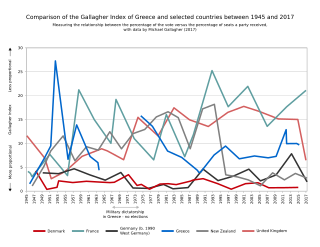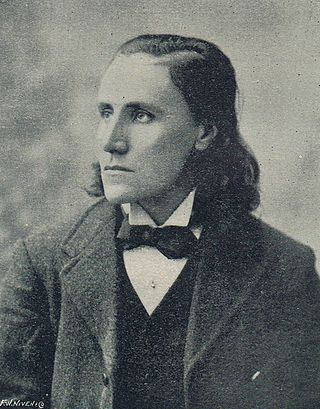Related Research Articles
The Reform Acts were legislation enacted in the United Kingdom in the 19th and 20th century to enfranchise new groups of voters and to redistribute seats in the House of Commons of the Parliament of the United Kingdom.

The 1895 United Kingdom general election was held from 13 July to 7 August 1895.

The National Museum of Australia, in the national capital Canberra, preserves and interprets Australia's social history, exploring the key issues, people and events that have shaped the nation. It was formally established by the National Museum of Australia Act 1980.

Edith Dircksey Cowan was an Australian social reformer who worked for the rights and welfare of women and children. She is best known as the first Australian woman to serve as a member of parliament. Cowan has been featured on the reverse of Australia's 50-dollar note since 1995.

Edith Cowan University (ECU) is a public university in Western Australia. It is named in honour of the first woman to be elected to an Australian parliament, Edith Cowan, and is the only Australian university named after a woman. Gaining university status in 1991, it was formed from an amalgamation of tertiary colleges with a history dating back to 1902 when the Claremont Teachers College was established, making it the modern descendant of the first tertiary institution in Western Australia.

Edwin Robert Anderson Seligman (1861–1939), was an American economist who spent his entire academic career at Columbia University in New York City. Seligman is best remembered for his pioneering work involving taxation and public finance. His principles for a progressive federal income tax were adopted by Congress after the passage of the Sixteenth Amendment. A prolific scholar and teacher, his students had great influence on the fiscal architecture of postcolonial nations. He served as an influential founding member of the American Economics Association.

The Gallagher index measures an electoral system's relative disproportionality between votes received and seats in a legislature. As such, it measures the difference between the percentage of votes each party gets and the percentage of seats each party gets in the resulting legislature, and it also measures this disproportionality from all parties collectively in any one given election. That collective disproportionality from the election is given a precise score, which can then be used in comparing various levels of proportionality among various elections from various electoral systems. The Gallagher index is a statistical analysis methodology utilised within political science, notably the branch of psephology.

Frederick Charles Burleigh Vosper was an Australian newspaper journalist and proprietor, and politician. He was well known for his ardent views and support of Australian republicanism, federalism and trade unionism.
Cornwall is a former county constituency covering the county of Cornwall, in the South West of England. It was a constituency of the House of Commons of England then of the House of Commons of Great Britain from 1707 to 1800 and of the House of Commons of the United Kingdom from 1801 to 1832. It was represented by two Knights of the Shire, elected by the bloc vote system.
Sir William Lemon, 1st Baronet was a Member of Parliament for Cornish constituencies from 1770 to 1824, a total of 54 years.
The historic county of Cornwall in south-west England was represented in Parliament from the 13th century. This article provides a list of constituencies constituting the Parliamentary representation from Cornwall.
Liskeard was a parliamentary borough in Cornwall, which elected two Members of Parliament (MPs) to the House of Commons from 1295 until 1832, and then one member from 1832 until 1885. The constituency was abolished by the Redistribution of Seats Act 1885.
Sir Arthur Pendarves Vivian was a British industrialist, mine-owner and Liberal politician from the Vivian family, who worked in South Wales and Cornwall, and sat in the House of Commons from 1868 to 1885.
Arthur Tremayne was a Crimean War soldier and Cornish MP, who survived the charge of the Light Brigade, during which his horse was shot from under him.
Great Cornish Families: A History of the People and Their Houses is a book by Crispin Gill, published in 1995. A second edition was published in 2011 (ISBN 978-0-85704-083-1). Crispin Gill, at the time of the book's publication, lived in Plymouth and was assistant editor of the Western Morning News. The book names many notable families that have featured prominently in Cornwall's history.
Harry C. J. Phillips,, , is a leading political and civic education advocate and political commentator in Western Australia. He has extensive teaching and lecturing experience in primary, secondary and tertiary institutions in political and civic education and has published widely in these fields, as well as sport, particularly tennis. Phillips's commitment to civics stems from his youth at Hyden Primary School, and his Alma Mater, Hale School.

Edward William Brydges Willyams was a Liberal MP, successively for three Cornish constituencies. In 1892, he was appointed High Sheriff of Cornwall.
Barry John House is an Australian politician who was a Liberal Party member of the Legislative Council of Western Australia from 1987 to 2017. He was President of the Legislative Council from 2009 to 2017, and prior to entering politics worked as a schoolteacher.
Hendy John Cowan is a former deputy premier of Western Australia.
Lyla Daphne Elliott was an Australian politician who was a Labor member of the Legislative Council of Western Australia between 1971 and 1986, representing North-East Metropolitan Province.
References
- ↑ "Professor Ed Jaggard". School of Arts and Humanities - Staff. Edith Cowan University. 28 April 2016. Retrieved 12 September 2020.
- ↑ "Staff Profile". Edith Cowan University. Archived from the original on 5 August 2009. Retrieved 2009-07-12.
- ↑ Booth, Douglas (2002). "The Dark Side of Surf Lifesaving". Journal of Sport History. 29 (1): 7–13. JSTOR 43610049.
- ↑ Sources: Cornwall Politics in the Age of Reform cited under "Publications" and ECU Website
- ↑ Taylor, Miles (2002). "British politics in the age of revolution and reform, 1789–1867". The Historical Journal. 45 (3): 661–677. doi:10.1017/S0018246X02002613.
- ↑ Bernstein, George L. (2001). "Edwin Jaggard. Cornwall Politics in the Age of Reform 1790–1885". Albion. 33 (1): 131–132. doi:10.1017/S0095139000066758.
- ↑ McWilliam, Rohan (2001). "Cornwall Politics in the Age of Reform, 1790-1885". The English Historical Review. 116 (466): 493. doi:10.1093/ehr/116.466.493. Gale A74691953.
- ↑ Cornwall, Jennifer (2007). "Between the Flags: One Hundred Summers of Australian Surf Lifesaving edited by Ed Jaggard". Public History Review. 14: 156–157. doi: 10.5130/phrj.v14i0.566 .